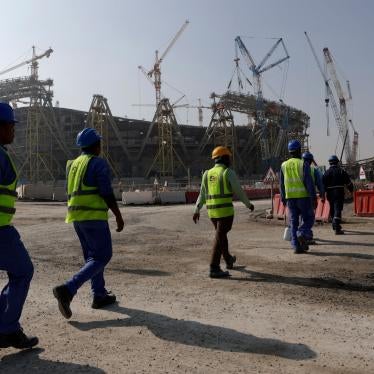Samuel Alabi Ago, a goalkeeper in a Ghanian youth football league, hoped to someday play for a senior team. Instead, poverty and mismanagement by his managers drove him to work in Qatar helping to make the 2022 FIFA World Cup possible. “I was playing football but it wasn’t getting me anywhere,” a dejected Samuel said in the 2017 documentary The Worker’s Cup, which showcases stories of Qatar’s migrant workers. He returned to Ghana in 2017 after developing chronic pain from operating heavy construction equipment.
Two months ahead of the World Cup, Qatar is still being rapidly transformed. Roads become unrecognizable overnight, even to local drivers. “Today you may have mastered a road, but tomorrow it will be under construction,” Robert (name changed for security), a Kenyan taxi driver said. An avid Brazil fan, he recalls being back home during the last World Cup. “I wanted to be part of the next one, so my dream is fulfilled, but I wish I earned better. I work 6 days a week, 12 hours a day and still struggle financially.”
Robert and Samuel are like many migrant workers from African countries including Kenya, Uganda, and Ghana, who have played an indispensable role in preparations for the World Cup.
But many migrant workers became victims of serious abuses like wage theft, injuries and even, unexplained deaths. Those who spoke up faced reprisal, including Kenyan security guard Malcolm Bidali who was forcibly disappeared and put in solitary confinement before being deported.
Given Qatar’s poor human rights record, FIFA should have anticipated it would need to address such abuses when it awarded the country the games in 2010. Yet FIFA and host Qatar largely failed to do so. Human Rights Watch, with a coalition of rights groups, have called on FIFA and Qatari authorities to provide remedy, including financial compensation, to migrant workers who have suffered harms while making the World Cup possible.
In a recent YouGov poll administered by Amnesty International, 93 percent of Kenyans surveyed supported the remedy call. Human Rights Watch wrote to all qualifying African football associations (FAs) including Senegalese, Ghanaian, Cameroonian, Tunisian, and Moroccan FAs asking them to publicly support the remedy call, but none responded. African states and regional institutions should also raise the issue of abuses and the call for remedy including in bilateral labor discussions between Qatari authorities and African states. With 60 days remaining until the kickoff, the time to act is now.









